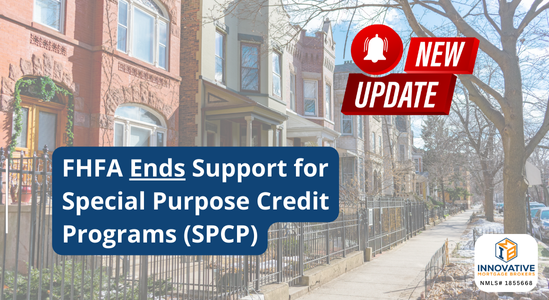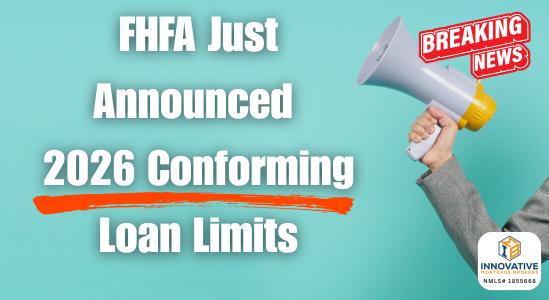Mortgage rate volatility, oil shocks, and why execution matters more than quotes When a war…
FHFA Ends Support for Special Purpose Credit Programs (SPCP)
What It Means for Borrowers and the Industry
In a significant policy shift, the Federal Housing Finance Agency (FHFA) has directed Fannie Mae and Freddie Mac to terminate their involvement in Special Purpose Credit Programs (SPCPs). The announcement, made end of March 2025, signals a departure from housing policies implemented in recent years to expand access to credit for underserved and disadvantaged communities.
The directive came from FHFA Director Bill Pulte and applies to all SPCPs currently backed or administered by the government-sponsored enterprises (GSEs). While lenders and institutions may still pursue SPCPs independently, Fannie Mae and Freddie Mac can no longer support or participate in these programs while under conservatorship.
What Are SPCPs?
Special Purpose Credit Programs are designed to address historical disparities in lending by offering tailored financing solutions for individuals who may not qualify under standard underwriting guidelines. SPCPs often include down payment assistance, flexible credit requirements, and other accommodations to help bridge the affordability gap for first-time homebuyers, low-income households, and historically disadvantaged communities.
Under previous federal guidance, GSEs were permitted to support SPCPs as part of broader housing equity initiatives. However, the latest FHFA directive rescinds that support, signaling a move toward a more limited and conservative role for the GSEs in promoting credit expansion.
Some Special Purpose Credit Programs (SPCPs) weren’t tied to where a borrower was buying a home—but rather where they currently lived. In many cases, eligible buyers received $4,500 to $5,000 toward down payment or closing costs, along with an additional $1,000 credit that could be applied toward things like an appraisal and a home warranty. These programs were designed to increase access to homeownership by helping qualified individuals in designated communities overcome upfront financial barriers. While these SPCPs are being phased out, there are still alternative programs available, and we can help you explore them.
Key Policy Changes
The new policy mandates that:
- Fannie Mae and Freddie Mac must terminate their participation in SPCPs.
- Any active programs must be wound down in accordance with contractual obligations.
- The GSEs are discouraged from engaging in any programs that are not directly aligned with their traditional underwriting and servicing roles while in conservatorship.
While this does not prohibit private lenders or banks from offering SPCPs on their own, it does limit the ability of these programs to scale nationally without GSE backing.
What This Means for Borrowers
The immediate impact of the policy change will likely be felt by borrowers who could benefit from more flexible qualification standards. SPCPs have provided a pathway to homeownership for many first-time buyers, especially those with limited savings, credit history challenges, or who are located in underserved communities.
Without GSE participation, these programs may become harder to access or limited in geographic availability. Prospective buyers who were relying on SPCPs to help cover down payments or reduce upfront costs may now need to explore alternative financing or delay their plans.
Reactions from the Mortgage Industry
The decision has drawn mixed reactions from the mortgage and housing community.
Some industry groups have expressed support, viewing the rollback as a necessary step to clarify the GSEs’ mission and avoid regulatory overreach. They argue that certain housing initiatives under prior leadership blurred the line between government-backed underwriting and broader social policy efforts.
Others, however, see the move as a setback to recent progress in improving access to homeownership. Advocates for affordable housing and housing equity contend that SPCPs have played an important role in narrowing the racial and economic homeownership gap. They warn that without targeted programs, many deserving borrowers could once again find themselves shut out of the mortgage market.
What’s Next?
This policy change is one of several recent reversals of housing directives from the previous administration. It underscores the current FHFA leadership’s preference for focusing on core safety and soundness responsibilities rather than broader social equity programs.
For lenders, this may mean recalibrating their loan offerings and revisiting how they structure SPCPs outside of the GSE framework. For borrowers, it’s a reminder of how quickly the regulatory environment can change — and the importance of staying informed about evolving mortgage guidelines.
At Innovative Mortgage Brokers, we specialize in helping clients across Pennsylvania and Florida navigate the mortgage process with clarity and confidence. If recent changes to loan programs like SPCPs have affected your eligibility, we’re here to guide you through alternative options. From seller assist strategies to local and county-based down payment assistance programs, we can help you explore creative solutions tailored to your financial situation and goals. Whether you’re a first-time buyer or looking for ways to make homeownership more affordable, we’ll work with you one-on-one to find the best path forward.
Final Thoughts
While the future of SPCPs without GSE support remains uncertain, one thing is clear: lenders, borrowers, and housing advocates will need to adjust. As the industry navigates this shift, there will likely be continued discussion about the best way to promote inclusive and responsible access to homeownership — and what role public and private sectors should play in that effort.
If you’re considering buying a home or looking into down payment assistance, it’s more important than ever to speak with a knowledgeable mortgage professional who can guide you through all available options in today’s changing landscape.





